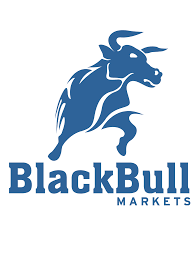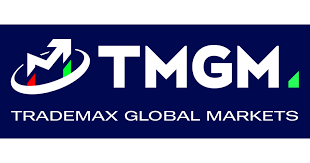Forex trading refers to the trading of currency in the international forex market. Forex trading is facilitated by forex brokers. Forex brokers allow traders to buy or sell currencies and profit from the price movement. Forex trading is inherently risky, and the chances of experiencing losses are significant.
Forex trading by retail traders (individuals without any professional background in finance) is legal in New Zealand. It is regulated by the Financial Markets Authority (FMA) of New Zealand. If you’re from New Zealand, you should only trade through a broker that is regulated by the FMA or global tier-1 and tier-2 financial authorities like the FCA of the UK, the ASIC of Australia, and the CySEC of Cyprus.
Show More
Comparison of Best Forex Brokers New Zealand
Best Forex Brokers New Zealand
Below is the comparison of Forex Brokers in New Zealand as per our analysis and reviews:
- CMC Markets – Best Forex Broker NZ Overall
- Plus500– Best for Wide Range of Trading Instruments
- IG Markets – Best Forex Broker for Trust and Safety
- BlackBull – Best for Third-Party Copy Trading
- TMGM – Low-Cost Broker
In this article, we’ll compare the best forex brokers that accept traders from New Zealand. To arrive at the comparison, we’ve thoroughly researched each broker and have also spoken to their customer support executives to find out about their services in detail. In this list, we’ve only talked about brokers that hold licenses from the FMA of New Zealand.
#1 CMC Markets – Best Forex Broker NZ Overall
EUR/USD Benchmark:
0.7 pips
Trading Platforms:
CMC Web & Mobile, MT4
CMC Markets was founded in 1989 and is one of the oldest operating forexes and spread brokers in the world.
Regulation: CMC Markets NZ Limited is regulated by the FMA and holds the FSP No. FSP41187.
Additionally, a group entity of CMC Markets is also regulated by the FCA of the UK, which is a tier-1 regulatory authority.
The broker also implements segregation of funds and negative balance protection.
We consider CMC Markets to be highly safe for traders residing in New Zealand.
Fees: CMC Markets charges a minimum spread of 0.7 pips when trading the benchmark currency pair of EURUSD. The minimum spread across instrument categories is 0.3 pips. CMC Markets does not charge a commission for trading forex instruments. These charges are applicable to those who hold a CFD account with CMC Markets.
The broker’s commission starts from 0.1% of the trade value. The commission is charged only for trading shares and not any other kind of instrument.
Trading Platform: CMC Markets offers MetaTrader 4 to its traders. Traders also have the option of trading through CMC Markets’ proprietary trading platform called Next Generation. You have to choose which trading platform you’ll use at the time of opening a live CFD account.
Both trading platforms are available on most devices including Windows, macOS, iOS, and Android.
Customer Support: Traders from New Zealand can access CMC Markets’ customer support through phone calls, emails, or a visit to the head office. The New Zealand office of CMC Markets is in Auckland.
CMC Markets provides a dedicated phone line and dedicated email ID to traders from New Zealand. However, this broker does not offer live chat on their website.
Read our CMC Markets Review for more on this broker.
CMC Markets Pros
- They offer low spreads and no commission for trading currency pairs
- They have a proprietary trading platform
- They offer dedicated customer support to traders from New Zealand
- They have a local office in New Zealand
CMC Markets Cons
- The number of trading instruments is limited
- They do not have a live chat option for customer support
#2 Plus500 – Best for Wide Range of Trading Instruments
Trading Platforms:
Plus500 Platform
Plus500 has been operating since 2008 and has grown into a listed company in a short period.
Regulation: Plus500AU Pty Ltd is licensed by the FMA and holds the FSP No. FSP486026. Additionally, the broker is also regulated by the tier-1 financial authorities FCA of the UK and the ASIC of Australia.
Further, Plus 500 provides segregation of funds and negative balance protection to its traders.
Overall, we consider Plus 500 to be highly safe for traders from New Zealand.
Fees: Plus500 charges a typical spread of 1 pip for trading the benchmark EURUSD currency pair. Plus500 does not charge any commission on trades.
They charge an inactivity fee as well as an overnight fee. They also charge extra if you take advantage of a guaranteed stop loss.
Plus 500 does not charge any fee for making a deposit or withdrawal.
Trading Platform: Plus500 does not offer the highly popular MetaTrader 4 or the MetaTrader 5. Instead, they have their own proprietary trading platform called Web-Trader.
This platform is available through a web browser or as a smartphone mobile app. The trading platform is not available as downloadable software for desktops.
Customer Support: Plus500 offers customer support through a live chat option available on their website as well as through email. We contacted them through live chat and found their response to be very quick and helpful.
Further, Plus500’s customer support team is available 24/7 which includes weekends.
Read our in -depth review of Plus500 here.
Plus500 Pros
- They are highly regulated and the same entity is regulated in both Australia and New Zealand
- They offer a wide range of trading instruments
- They are very transparent about the fees that they charge
- They do not charge a commission and their spreads are low
Plus500 Cons
- They do not offer MetaTrader 4 or MetaTrader 5
- They do not offer educational material for beginners
#3 IG Markets – Best Forex Broker for Trust and Safety
EUR/USD Benchmark:
1.1 pips
Trading Platforms:
MT4, IG Proprietary
IG was founded way back in 1974 and is one of the most trusted forex brokers in the world. They have won several notable awards for the quality of their services.
Regulation: IG Markets Limited is regulated by the FMA and holds the FSP No. FSP18923. Further, IG Markets is also regulated by tier-1 regulators like the FCA of the UK and the ASIC of Australia.
IG Markets is one of the most highly regulated brokers in the forex brokerage space. The company has several group entities that hold licenses in several top-tier jurisdictions.
IG Markets provides negative balance protection and segregation of funds to traders from New Zealand.
Overall, we consider IG Markets to be highly safe for traders from New Zealand.
Fees: IG Markets charges a typical spread of 1.1 pips for trading the benchmark EURUSD currency pair. They do not charge a commission for trading forex pairs. They only charge a commission for trading share CFDs.
IG Markets does not charge a deposit fee or withdrawal fee. However, they do charge an inactivity fee.
Trading Platform: IG Markets has its own trading platform, or you can use the highly popular MetaTrader 4.
The IG Markets platform is available on web browsers as well as a mobile trading app. It is not available as desktop software.
Overall, their own platform is helpful if you need a user-friendly app for trading.
Customer Support: IG Markets primarily provides customer support to traders from New Zealand through a live chat option available on their website. This option is only available on weekdays.
You can also access detailed FAQs and the Help section available on their website.
Further, you can contact them through phone call or email, however, they do not have a dedicated handle for traders from New Zealand.
IG Markets Pros
- They are a very highly regulated and reputed broker. They are also a listed company
- They have been in operation for a very long time
- They have a detailed website which answers most questions that a trader might have
IG Markets Cons
- They do not have a local office in New Zealand
- They offer only one type of trading account
#4 BlackBull – Best for Third-Party Copy Trading
EUR/USD Benchmark:
0.9 pips
Trading Platforms:
MT4, MT5
BlackBull was founded in 2014 and has made a name for itself in a short time. The broker brings the latest financial technology to online trading.
Regulation: Black Bull Group Limited is licensed by the FMA and holds the FSP No. FSP403326. Further, Black Bull is regulated in Seychelles.
Black Bull is a relatively new broker and does not have licenses from tier-1 financial authorities yet. However, since they are regulated by the FMA, they are considered safe for traders from New Zealand.
Black Bull also offers segregation of funds and negative balance protection.
Fees: Black Bull charges a typical spread of 0.9 pips for trading the benchmark EURUSD currency pair through their Standard account. They do not charge a commission when trading through the Standard account. They charge a minimum initial deposit of $200, which is high when compared to other brokers.
They do not charge any type of hidden fees including deposit fees, withdrawal fees, or inactivity fees.
Trading Platform: Black Bull offers the MetaTrader 4 and the MetaTrader 5 trading platforms. These platforms are available for almost all devices including Windows, macOS, Android, and iOS. You can even access this platform through any web browser.
They do not have their own proprietary trading platform.
Customer Support: Black Bull provides customer support through email and live chat. The live chat option is available 24/6, so it is not available on Sundays. Overall, they provide decent customer service in a timely manner.
Further, traders can make use of their extensive Help section to solve any issues.
Black Bull Pros
- They charge low fees
- They provide the highly popular MT4 and MT5 trading platforms
- Their customer support is available on Saturdays
- They do not charge any hidden fees
Black Bull Cons
- They are a relatively new broker
- They are not highly regulated
#5 TMGM – Low-Cost Broker
Trading Platforms:
MT4, MT5, IRESS
TMGM of Trade Max Global is a new forex broker that has been operating since 2013.
Regulation: TradeMax Global Markets (NZ) Limited has been licensed by the FMA and holds the FSP No. FSP569807.
The broker also provides negative balance protection and segregation of funds.
Overall, we consider this broker to be safe for traders from New Zealand.
Fees: The typical spread for trading the benchmark EURUSD currency pair is 1 pip through the Classic account.
The Edge account allows you to trade with spreads as low as 0 pips, however, you are charged a commission of $3.5 per lot per trade.
Overall, the fees charged by TMGM are slightly lower than average.
Trading Platforms: TMGM offers the MetaTrader 4 and MetaTrader 5 trading platforms. You can choose between them, regardless of which type of account you’ve decided to open.
Both these platforms are available on almost all devices and also support third-party integrations.
Customer Support: TMGM provides customer support through live chat, phone call, or email. It is quite easy to get in touch with them and their contact details are easily available on their website.
The customer support team is available at all times.
TMGM Pros
- They provide good customer support
- They provide a wide range of trading instruments
- They charge below-average fees
TMGM Cons
- They do not have their own trading platform
- They do not have an extensive help section
Who is a Forex Broker?
A forex broker offers brokerage services to retail and professional traders who want to speculate on currency pairs & other markets as CFDs, by going long (buy) or short (sell). Through a forex broker, your profit or loss from trading CFDs is cash settled in a brokerage account you have opened with the broker.
A forex broker could be a market maker which means they could be taking the opposite sides of your trades or a no-dealing desk broker that connects you to buyers/sellers through their liquidity providers via computerized networks.
How to Choose a Forex Broker?
There are several forex brokers out there, and most of them provide their services to traders from New Zealand. In such a market, it can be hard to choose a forex broker that suits your needs. There are several factors that you need to consider before choosing a broker.
1. FMA Regulation: If you’re from New Zealand, then the first thing that you should check is whether the broker is regulated by the FMA or the Financial Markets Authority. Being regulated by the FMA means that the broker can be trusted and that the money that you’ve deposited is safe. It also means that you can approach the FMA or pursue legal action in case there is an issue.
Another way to know if a forex broker is low-risk is to check if they are licensed with top-tier regulatory bodies. Forex brokers in New Zealand have the local FMA regulation. However, there are other top licenses that make a broker reputable.
These licenses include the FCA (UK) and ASIC (Australia). You can also consider CySEC (Cyprus). If your broker is regulated with FMA plus one or more of these regulatory entities, the risk of fraud is lower. Pus500 is an example of such a broker in New Zealand. Here is how you can confirm this.
On the Plus500 New Zealand homepage, scroll down to the footer. You will find their regulations as shown below
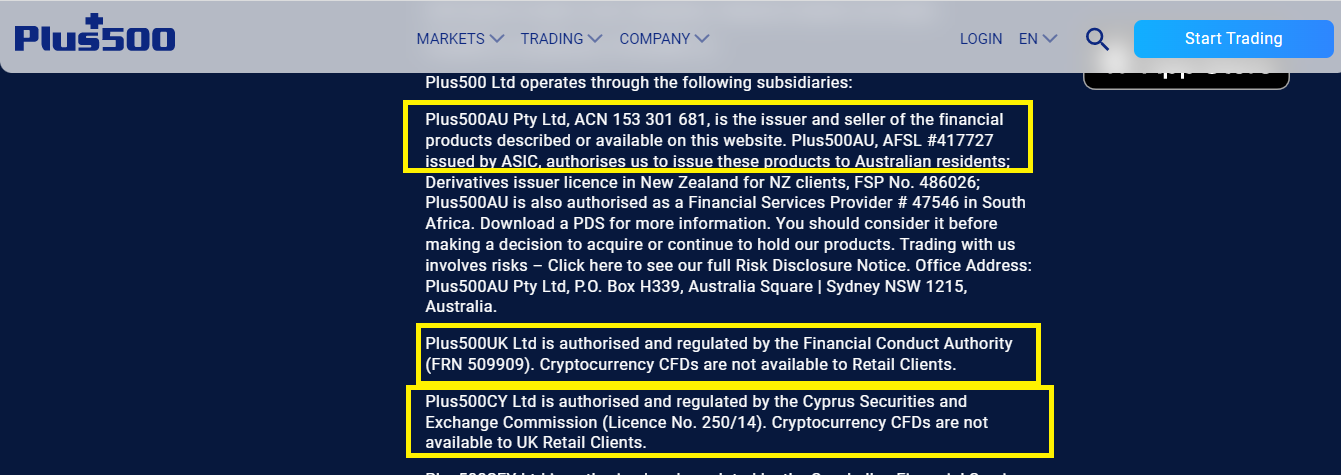
This system of confirmation might not work for all brokers. Some brokers like CMC Markets do not have their regulations listed on their homepage. The best way to check for this type of broker is to speak to their customer support.
When you get the regulation details from your broker, you can choose to verify independently. You can go the the FMA’s website and confirm if the details from your broker matches the FMA’s.
Here is how you can do this in simple steps. We will use Plus500 as our example.
Go to FMA’s website and click ‘Licensed and reporting entities’.
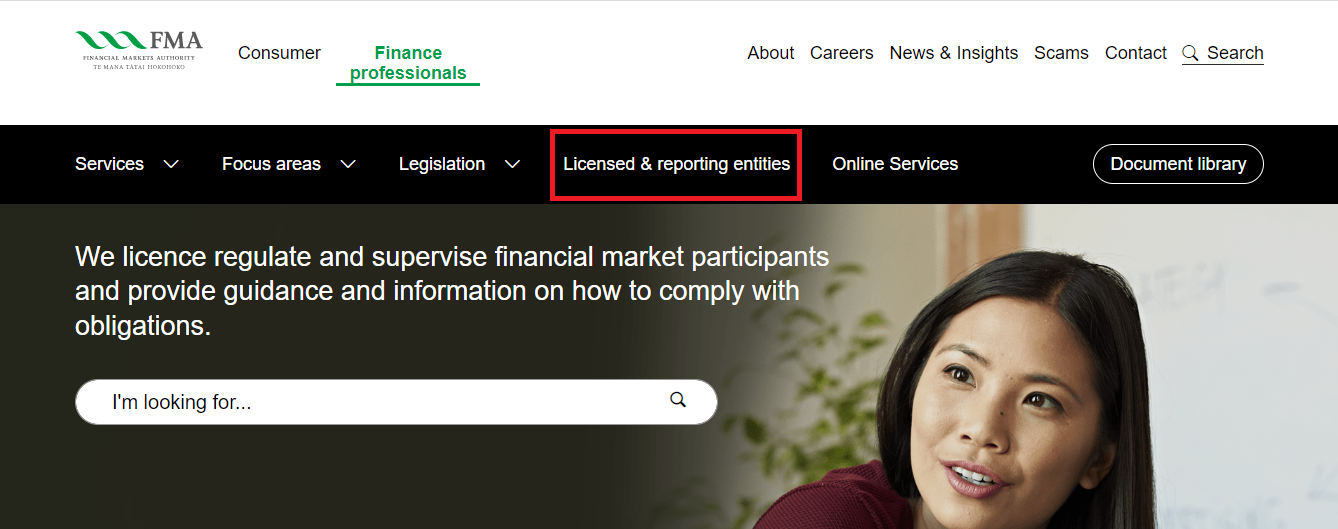
On the response page, enter your broker’s registered name which is Plus500AU Pty Ltd. Select ‘Derivatives Issuer’ and click search.
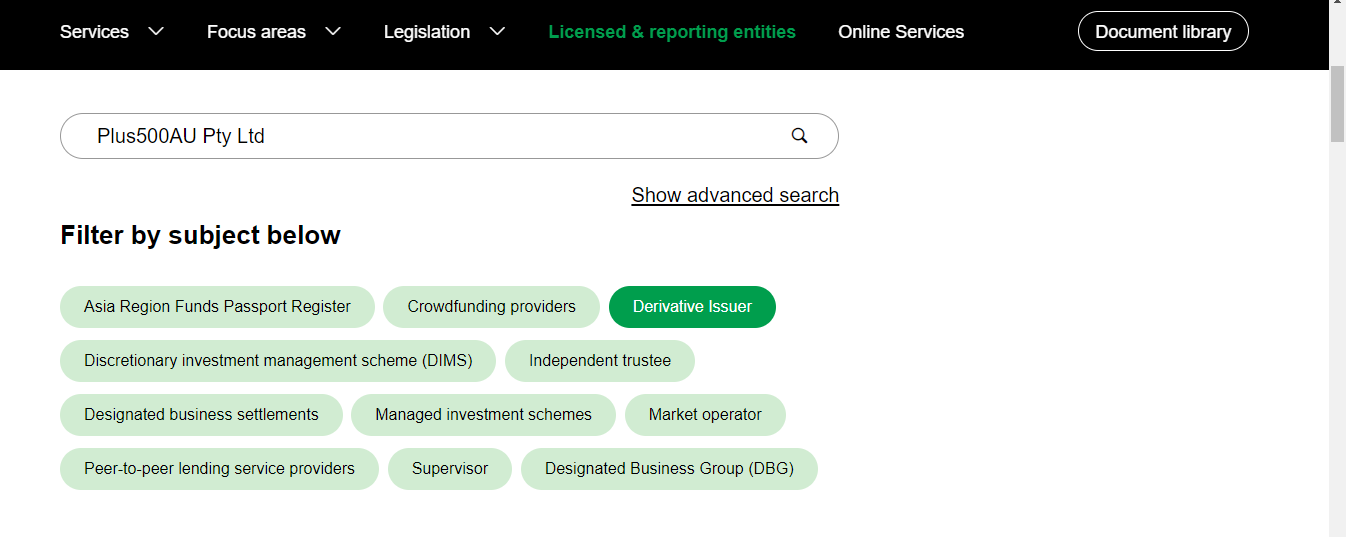
The picture below should be your final result.
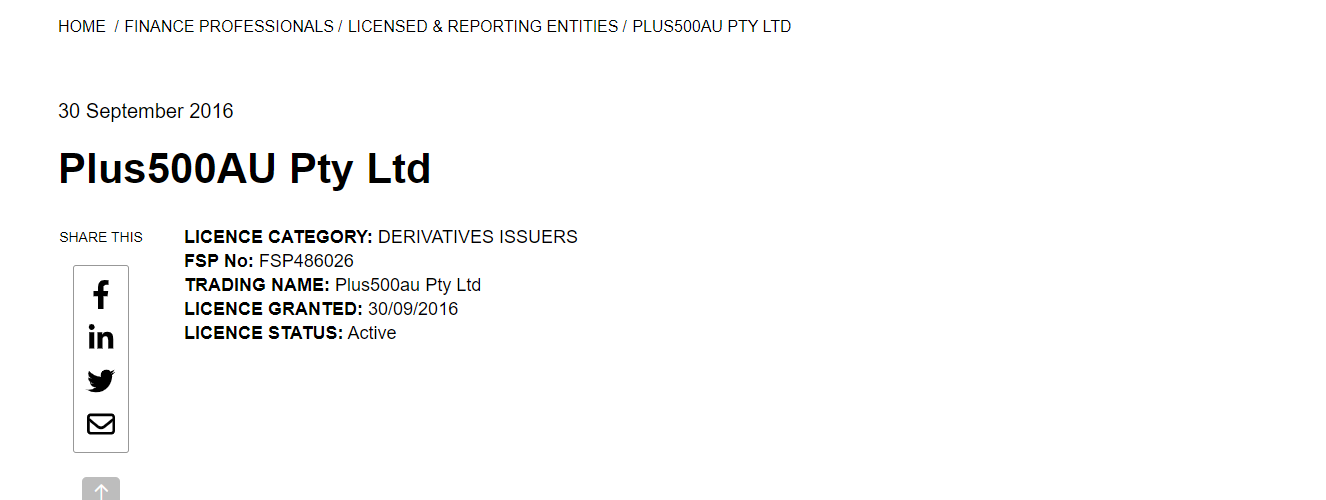
As you can see, the broker’s name and FSP number matches what we found on their website. With this step, you can weed out fraudulent brokers that the FMA does not recognize.
Overall Fees: Needless to say, the fees charged by the broker play a large role. You should try to trade through a broker that charges reasonable fees (but not too low because that is suspicious). Overall fees comprise trading fees and non-trading fees.
Trading fees include spreads, commissions, and overnight charges (swaps). These three determine your final loss or profit so it is important to always check them. In addition, they can also vary per account type. Some accounts might be commission free while some are not. So you have to check to determine what works for you.
Let us show you how you can check CMC Markets’ fees for example. On their homepage, click on ‘Products’. You will see a dropdown that contains the fees section as displayed below.
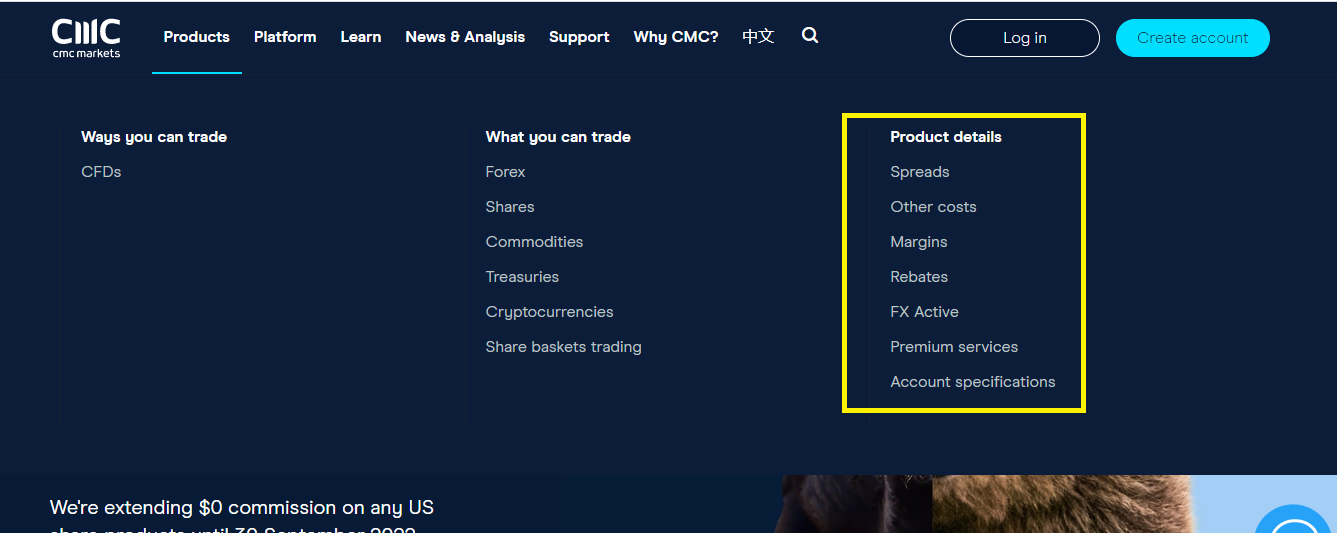
You can navigate through the section in the yellow box to get details about the fees. If you click on spreads, for example, you will get the image below
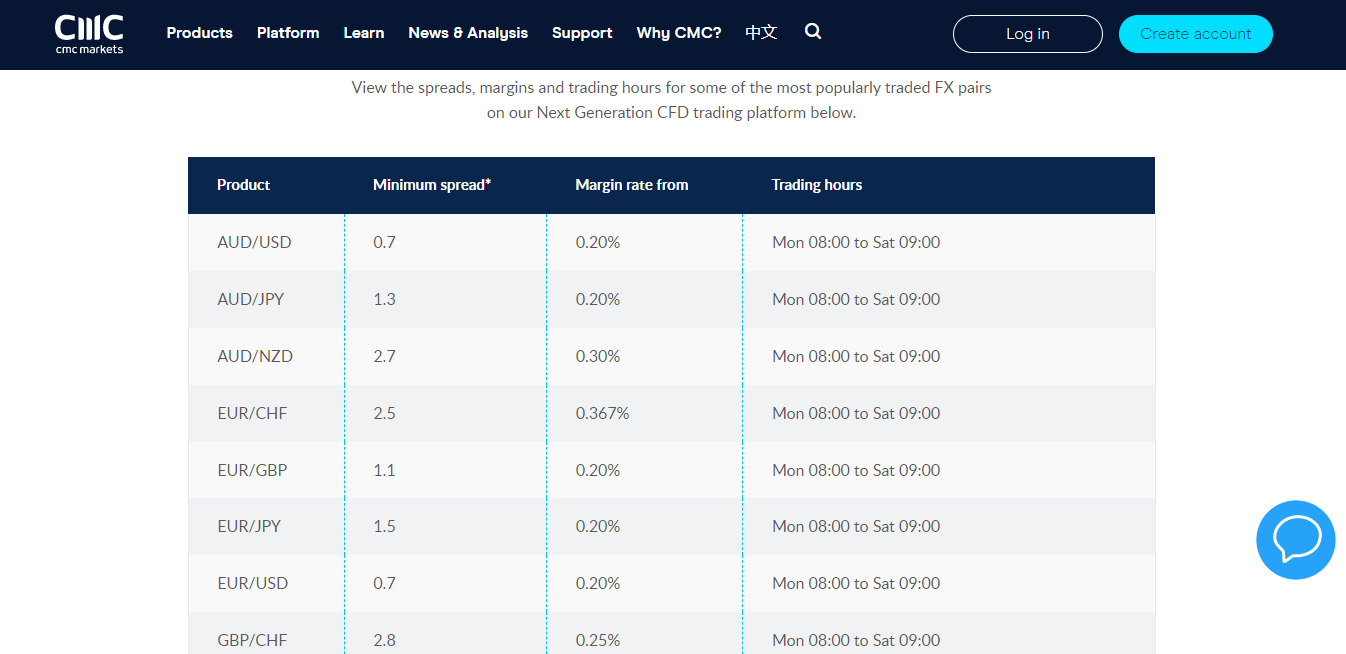
2. Account types
Brokers usually give a breakdown of account types on their websites. You will also find in this breakdown the key features of the accounts. You want to look for an account with low spreads and low commissions. This is a major factor to consider when choosing your trading account.
So, how do you choose your account?
It is simple. As you continue your signing-up process, the account types available at the broker will be presented to you. All you have to do is select your choice with one click. Let us see what it looks like at CMC Markets(example broker).
Here is a screenshot of CMC Markets’ New Zealand account selection.
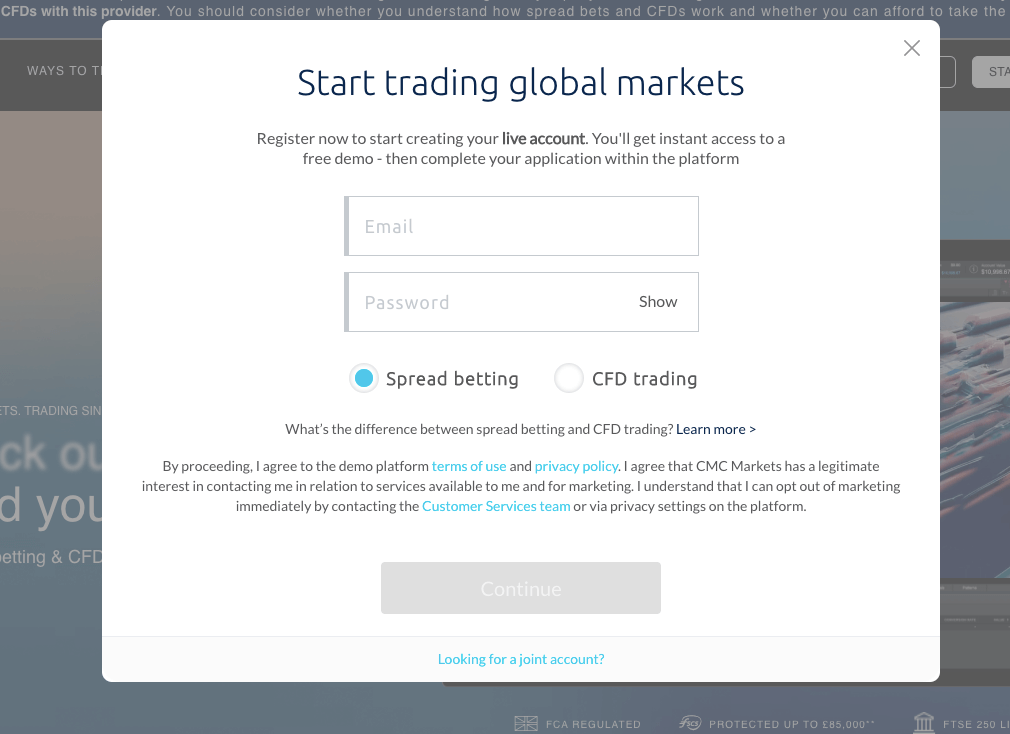
At the bottom of the image, you can see that there is an option to choose the spread betting or CFD trading account. You will come across this as you try to sign up. All you have to do is click the one you prefer. You will find that section with every broker. It might not look like this exactly. But you will be the one to decide regardless.
You should also know that there are brokers with one single account type. There isn’t any choice to make here. You open an account and you are good to go.
3. Range of Instruments: You should always check whether the instruments that you want to trade are offered by the broker. Nowadays a lot of traders want to trade cryptocurrencies, but they are not offered by every broker. In addition, not all brokers have volatile currency pairs from emerging economies.
As a trader, you want to have a variety of options. So you have to check a forex broker’s website for more details on the CFDs they offer. Let us look at BlackBull as an example. On Blackbull’s website, click ‘Markets’. This should show you the broker’s market range as shown here
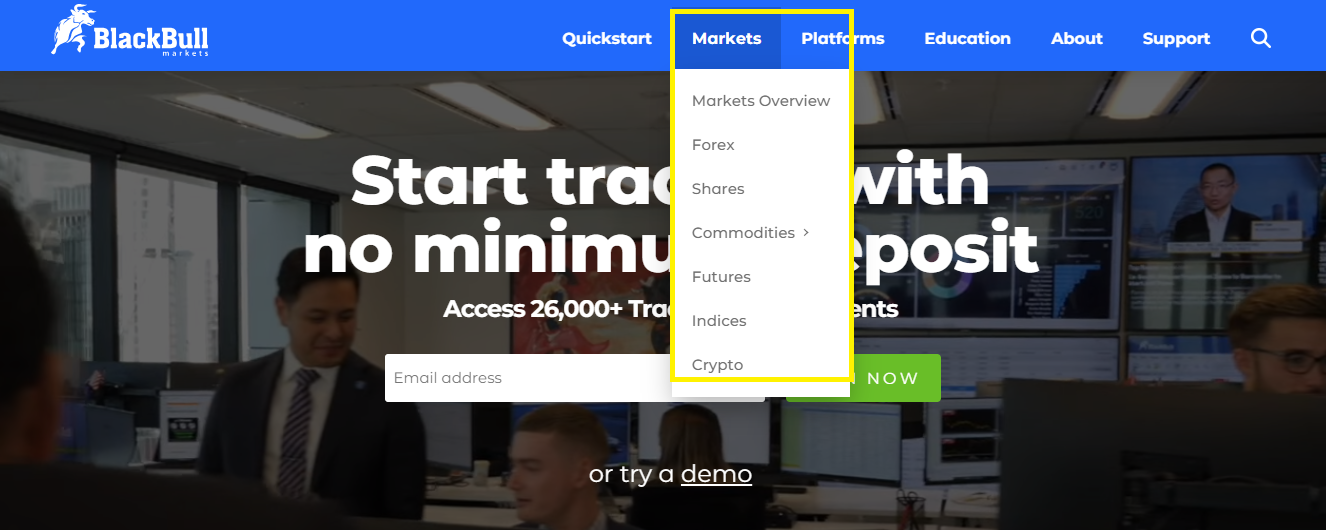
As you can see, there is forex, shares, commodities, cryptos, etc. For specific trading conditions on individual CFDs in the market, click on any of the instrument classes. During our research, we clicked on forex and this is what we found.
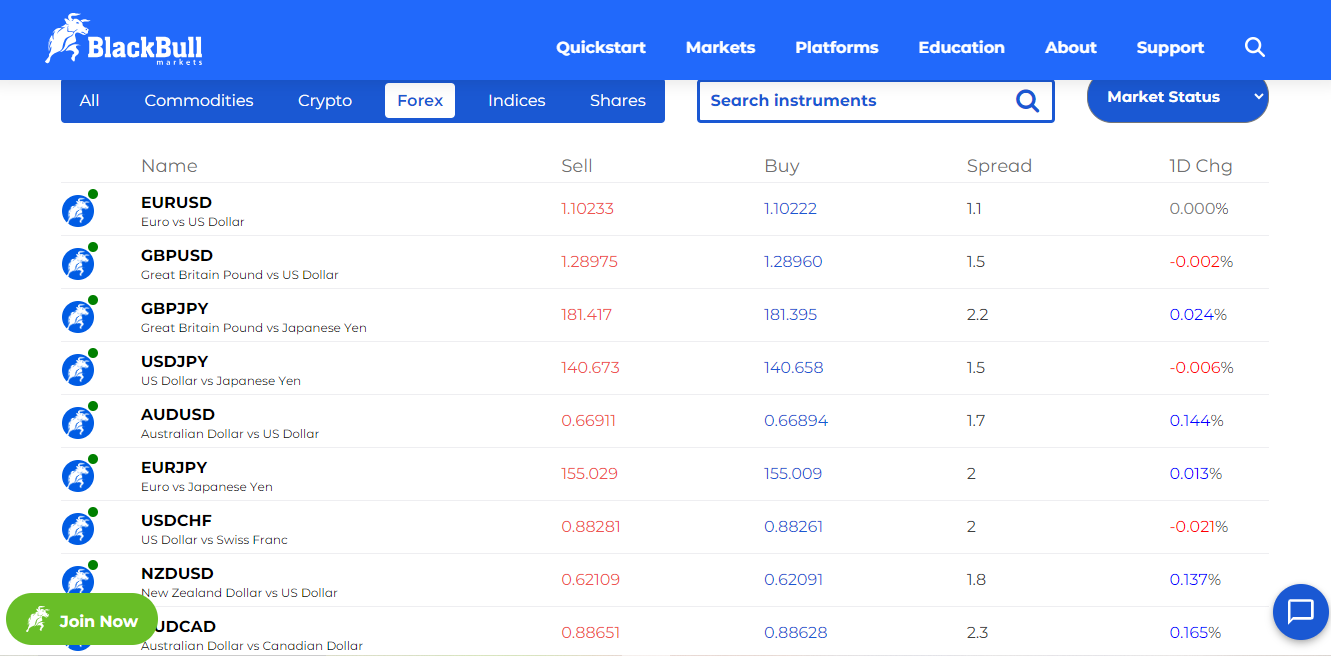
You can repeat these steps for most brokers in New Zealand and get the result you need.
4. Trading Platforms: Metatrader 4 (MT4) and Metatrader 5 (MT5) are the most popular third-party trading platforms. Not all brokers have them though. What you want to pay attention to here are platform-specific features.
Some brokers have more instruments on their MT4 platform than MT5. There could even be differences in swaps and commissions across the two platforms. So make sure to look this up on the broker’s website. In addition, the platforms should be multi-device. Mobile trading apps are handy for on-the-go trading. Desktop versions/web traders give you a better view of the price. You will need to combine these devices for effective trading so make sure you check.
Here is how we checked with BlackBull Markets for example. On their homepage, click ‘PLATFORMS’

From their website, BlackBull Markets has MT4, MT5, cTrader, and TradingView. The webtrader is for MT4 and MT5. You can look through each trading platform for more information about their features by clicking them.
Furthermore, some forex brokers also have their proprietary forex trading platforms. These platforms are developed by the company for the company. Traders hardly use these platforms for varying reasons. One of them is because of poor interface. However, brokers have greatly improved their platforms over the years with good trading conditions that may or may not be available on their third-party platforms
The availability of copy trading is another important thing to check. You will find this on the broker’s website if it is available.
5. Percentage of Losing Retail Traders: The FMA regulates forex trading in New Zealand. However, they do not make it mandatory for forex brokers to disclose the percentage of retail traders that lose their money. Only brokers regulated in the UK are mandated to reveal this.
This factor is important because there is an industry benchmark of around 75% for losing traders. If a forex broker has a percentage higher than this, then something could be wrong. So, how do you check it? Go to the UK version of your chosen broker’s website. You will find the percentage in the header of the website. That is where most brokers display it.
If you don’t find it there, then scroll down to the footer. In this review, CMC Markets, IG Markets, and Plus500 are UK-regulated brokers so they have this data on their websites. Here is a screenshot from the UK version of CMC Markets’ website.
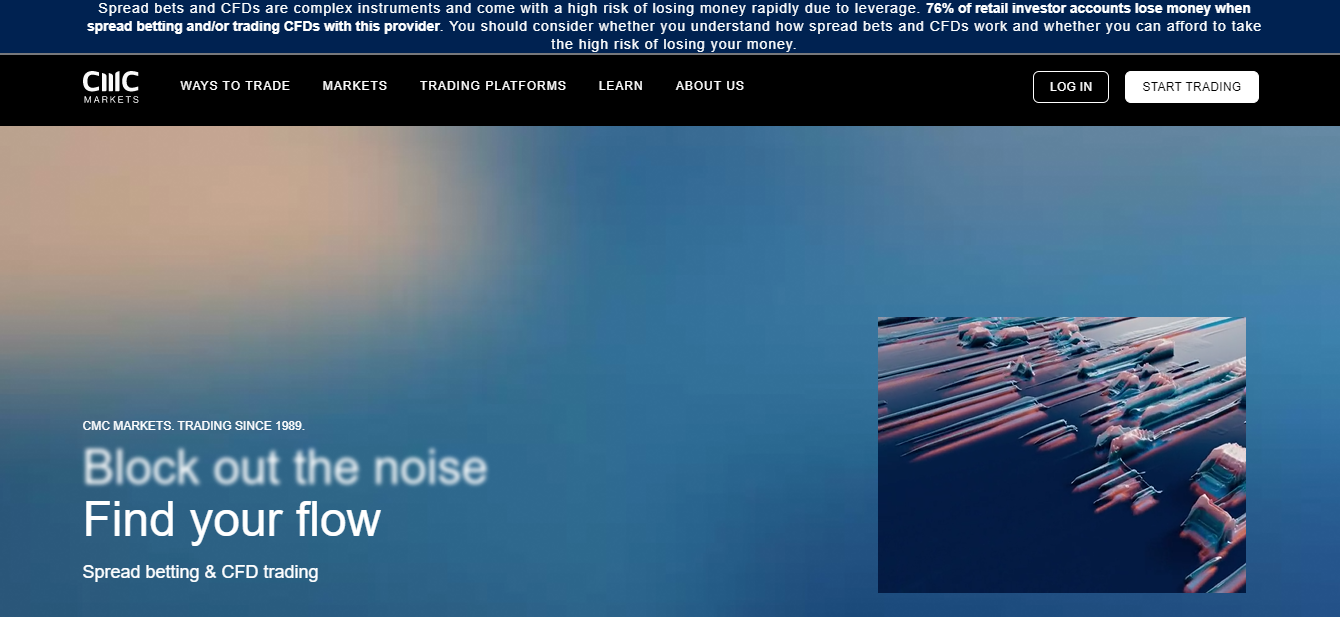
From the image, you can see that 76% of retail investors lose their money.
6. Local Support: Almost every broker that is regulated by the FMA provides dedicated customer support to traders from New Zealand. You should check whether the broker has a local office in New Zealand and whether they have a local phone number.
You might also want to test how fast they attend to customer inquiries. You can do this by sending the broker an e-mail or calling their NZ phone number. You don’t need to be a client to do this.
7. Other trading conditions
a. Order types: Varying order types help give you options in the market. Limit and stop orders can come in handy in entering the market at the right time and price. Your chosen broker must have these orders available on their platform.
Guaranteed stop-loss orders close your trades at specified prices. This order is executed regardless of market conditions. It is important your broker has this service in place because it is key for risk management. In addition, GSLOs are not free. So check with your broker to know if they have it and how much they charge.
b. Deposit/Withdrawals: Quick processing, multiple deposit/withdrawal methods, and low charges are the factors to keep a close eye on here. You should also be able to deposit and withdraw through your local bank. Most forex brokers do not charge extra fees for deposits/withdrawals. However, you can incur charges from your bank or e-wallet providers. Your broker does not receive any of these fees.
Summarily, what you want here is a broker with fast processing with little to no fees. Let us show you how to find the methods available with your broker. We will use BlackBull Markets as our example. We check these details by going to their New Zealand website. On BlackBull Market’s homepage, click ‘Support’. You will see a dropdown with different options. In the dropdown, click ‘Deposits’ or ‘Withdrawals’
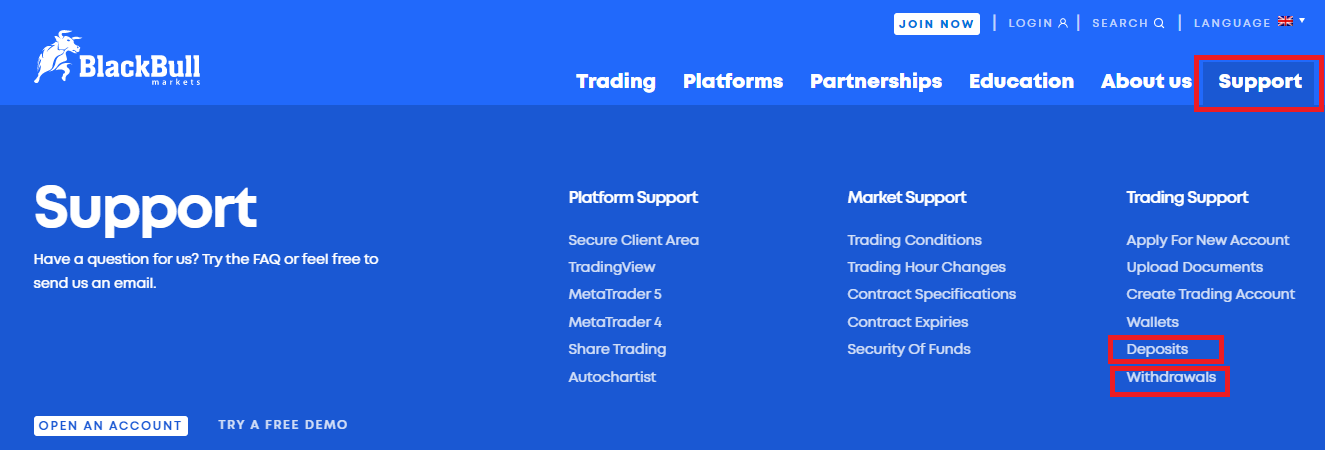
Clicking either of the two options will bring you to the page displayed below. The page shows the multiple payment methods available with this broker.

Seven unique payment methods are available with BlackBull Markets so you can choose anyone you desire.
c. Negative balance protection: Without negative balance protection, you can lose more than the funds in your trading account. It is required in almost all jurisdiction that traders are protected from this.
If your chosen broker is regulated with the FMA, you can be sure that they offer negative balance protection. Can you see why trading with a regulated broker is important?. You can even confirm with your broker if they provide negative balance protection.
By contacting their support, you can verify. However, some brokers have FAQs on their websites. You can use it to verify if they have this risk management tool without waiting for an email or live chat response.
Finally, forex brokers are not mandated to provide negative balance protection if you are a professional trader. However, retail traders are guaranteed to get it.
d. Education: Education is key. A forex broker should be friendly to beginners. Structured online courses, webinars, articles, and free research tools a forex broker should offer. These should be offered free of charge without extra costs.
Finding a broker’s education is easy. It is usually on their homepage. With a few clicks, you can access quality courses for your learning. Let us show you how you can do this (CMC markets are our example). On their homepage, click on ‘Education & Insights’ (in the yellow box). Here is an illustration below.
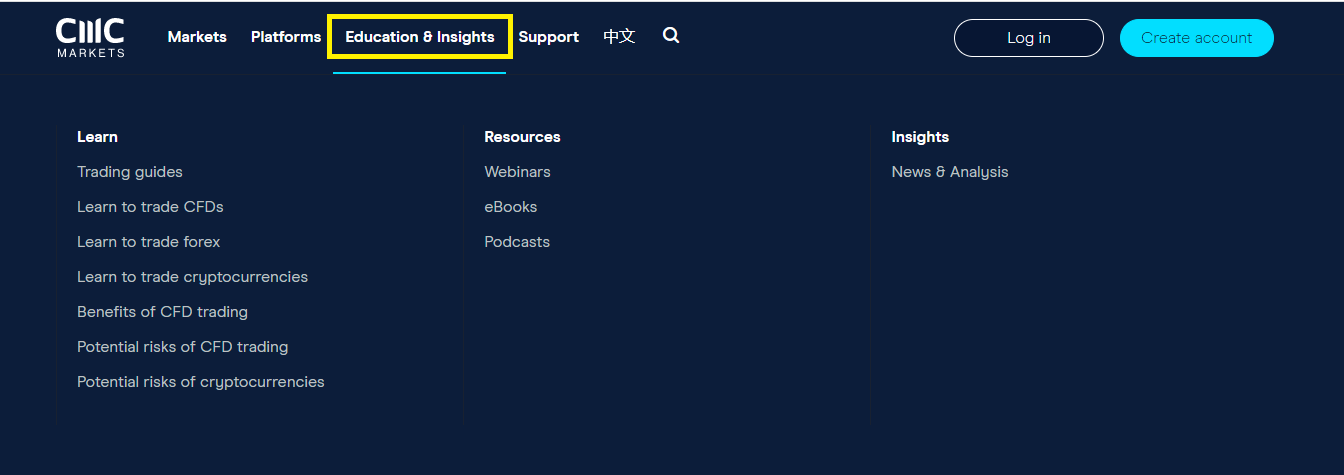
From the image, you can see that CMC Markets has webinars, e-books, podcasts, etc. You can use any of these means to expand your knowledge about forex and CFD trading.
How to Check Whether a Broker is Regulated by the FMA?
You should always double-check whether a broker is regulated by the FMA. It is a quick process and does not take more than five minutes.
You should go on the website of the broker and check their regulations or licenses. If they’re regulated by the FMA, they will mention it on their website.
For example, this is a screenshot from the website of CMC Markets where they mention that they are regulated by the FMA.
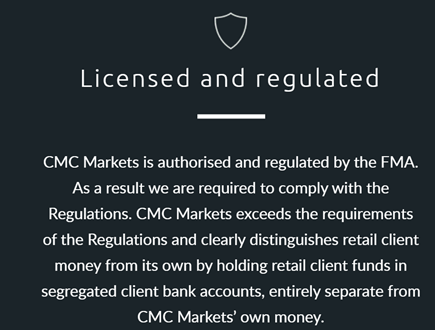
Once you’ve found the information on the broker’s website, you can access the FMA’s website and cross-check it through their directory. The FMA’s website has a list of all entities that are licensed by them.
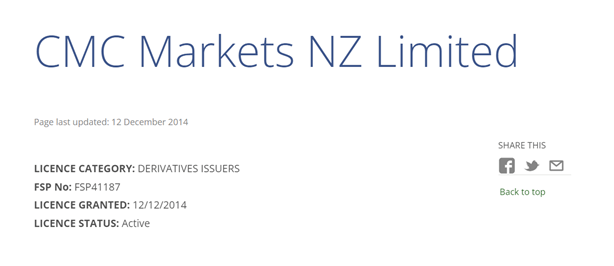
What is a forex broker?
A Forex broker, also known as a foreign exchange broker or FX broker, acts as a middleman between you and the massive, global market for trading currencies.
Here’s what they do:
They provide access to the Forex market:
Think of them as your gateway to buying and selling different currencies.
They offer trading platforms where you can execute your trades and monitor currency prices.
They facilitate currency exchange:
You don’t directly interact with other traders. The broker matches your buy orders with sell orders from other clients or directly fulfills them (depending on the broker type).
They ensure smooth and secure transactions, eliminating the need to worry about counterparty risk.
They make money through fees:
They typically charge spreads (the difference between the buy and sell price of a currency pair) or commissions on your trades.
Do I need a broker for Forex Trading?
Yes, you generally need a forex broker to trade in the foreign exchange market. They act as an intermediary between you and the vast interbank market where currencies are actually traded. Here’s why:
1) Access to the Market: Retail traders like you and me can’t directly access the interbank market. Forex brokers have the licenses and relationships to do so, and they provide you with a platform to place your buy and sell orders.
2) Order Execution: Your broker takes your order and finds a counterparty to match it with on the interbank market. They handle the execution of the trade, ensuring it’s done efficiently and at the best available price.
What are some red flags to watch out for when choosing a forex broker?
Its best to trade with forex brokers that offer some form of safety for your funds. Here are some red flags to avoid when choosing a forex broker:
1) Unregulated Brokers: Do not trade with forex brokers that are not regulated. Only trade with brokers who are regulated by a reputable authority.
2) Hidden Fees: Another sign to avoid a broker is high fees or commissions. Make sure you know and understand all the costs associated with trading before you open an account with any broker.
3) Absence of risk management tools: Because the forex market is risky, you should avoid brokers that do not have risk management tools or features, such as stop loss order.
How much money do I need to begin forex trading?
There is no specific amount that applies to every trader or forex brokers. The minimum deposit for forex trading is a decentralized phenomenon. No regulatory body enforces minimum deposit. It all depends on how each broker wants to operate. This is the first factor.
Some brokers have trading accounts with no minimum deposit. There could also be accounts with low minimum deposits requirement like NZD 50. There are a few brokers with minimum deposits as high as NZD 500 or more. So when it comes to the money you need to begin trading, your forex broker is a key factor.
The second factor is you. You need to consider your risk tolerance, trading goals, and financial state. How much are you willing to lose trading? How much is your gross monthly income? Why am I trading? These are pivotal questions you need to ask yourself. The answers to these questions will affect how much you put in your trading account.
How do you choose the amount to begin forex trading? A good consideration of the two factors above will help you make the right choice. After determining how much you are willing to risk in trading, then you need to choose your ideal broker.
If your risk tolerance is low, then you might have to choose brokers with zero minimum deposit account or low minimum deposit account like NZD 5-NZD 10. Though this little money, you can trade more positions with it using leverage. However, you should note that you can lose all of your money with leveraged CFD trading.
Even if your risk tolerance is high or you have enough money to trade CFDs, we caution that you do not put too much money in CFD trading because it is very risky.
FAQs on Best Forex Brokers New Zealand
Is Forex Trading Legal in New Zealand?
Yes, forex trading is legal in New Zealand and it is regulated by the FMA.
Which forex broker is the best for traders from New Zealand?
Each broker provides different trading conditions, so you should find the broker that suits your needs the most. A list of some of the best brokers has been provided above.
Can a forex broker steal your money?
A forex broker cannot steal your money legally. Though there are fraudulent brokers out there, you can avoid them by trading with FMA regulated brokers on;y. This way, you guarantee the safety of your funds.
Is forex taxable in NZ?
In New Zealand, gains from forex trading are considered income. Therefore, they are taxable.
Can I Trade Forex with $100?
Yes, you can trade forex with $100 or even less. However, remember that forex trading is risky and you could lose your money.





